 Petzlover
Petzlover Both Antebellum Bulldog and American Mastiff are originated from United States. Antebellum Bulldog may grow 25 cm / 9 inches shorter than American Mastiff. Antebellum Bulldog may weigh 22 kg / 48 pounds lesser than American Mastiff. Antebellum Bulldog may live 3 years more than American Mastiff. Antebellum Bulldog may have more litter size than American Mastiff. Both Antebellum Bulldog and American Mastiff requires Low Maintenance.
Both Antebellum Bulldog and American Mastiff are originated from United States. Antebellum Bulldog may grow 25 cm / 9 inches shorter than American Mastiff. Antebellum Bulldog may weigh 22 kg / 48 pounds lesser than American Mastiff. Antebellum Bulldog may live 3 years more than American Mastiff. Antebellum Bulldog may have more litter size than American Mastiff. Both Antebellum Bulldog and American Mastiff requires Low Maintenance.
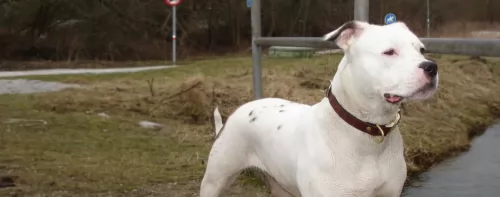 The history of the Antebellum Bulldog dates back the 1600s where it was used as a lasting solution to drive away hogs in rice plantation farms in Altamaha River in Georgia. After the plantation system became dominant in most parts of the United States, a majority of the farmers had to think of a more creative way of driving away wild feral pigs and cattle. Having caused multiple deaths to humans due to their massive bodies and extremely sharp horns, farm owners had no option but to employ bulldogs as the only means of security.
The history of the Antebellum Bulldog dates back the 1600s where it was used as a lasting solution to drive away hogs in rice plantation farms in Altamaha River in Georgia. After the plantation system became dominant in most parts of the United States, a majority of the farmers had to think of a more creative way of driving away wild feral pigs and cattle. Having caused multiple deaths to humans due to their massive bodies and extremely sharp horns, farm owners had no option but to employ bulldogs as the only means of security.
Although these dogs served their purpose of protecting their masters while still being family companions, their age of extinction came during the Civil War where the economy at the Altamaha region was permanently altered. After the fall of plantation farming and abolition of slavery, the Antebellum Bulldog became a forgotten breed something which led to its extinction. However, as years passed by, this rare breed was eventually reintroduced by the Maxwell family under strict guidelines by the Animal Research Foundation.
 The history of the American Mastiff is entirely tied to the old European Mastiffs but in particular the English Mastiff. The developers of the American Mastiff crossed the English Mastiff with the Anatolian Mastiff at the Ohio kennel, Flying W Farms. The founder of this breed is Fredricka Wagner. Because of this the English Mastiff and the American Mastiff look very much alike. The difference between the two is that the American Mastiff was bred to have less health concerns than the English Mastiff and without the drooling. In 2000 the CKC acknowledged that the American Mastiff and the English Mastiff were separate breeds.
The history of the American Mastiff is entirely tied to the old European Mastiffs but in particular the English Mastiff. The developers of the American Mastiff crossed the English Mastiff with the Anatolian Mastiff at the Ohio kennel, Flying W Farms. The founder of this breed is Fredricka Wagner. Because of this the English Mastiff and the American Mastiff look very much alike. The difference between the two is that the American Mastiff was bred to have less health concerns than the English Mastiff and without the drooling. In 2000 the CKC acknowledged that the American Mastiff and the English Mastiff were separate breeds.
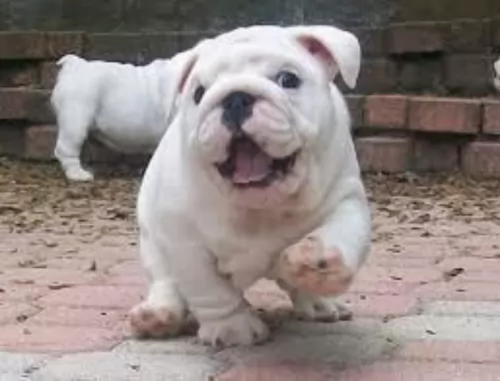 The Antebellum Bulldog is a recently introduced breed that was developed with an aim of recreating the historic working bulldog or Southern breed. First introduced in the United States, this bulldog was initially bred to be used as a working dog in rice plantations in Altamaha River Valley, a region in South East Georgia.
The Antebellum Bulldog is a recently introduced breed that was developed with an aim of recreating the historic working bulldog or Southern breed. First introduced in the United States, this bulldog was initially bred to be used as a working dog in rice plantations in Altamaha River Valley, a region in South East Georgia.
By nature, the Antebellum Bulldog is an extremely loving, loyal, affectionate, and very intelligent pet. Due to that reason, this breed is a perfect choice for a family dog. If we can get back to history, it’s evident that this dog breed was used in plantation farms to secure the rice from damages caused by cattle and wild hogs. Relating these tasks to the dog’s overall personality, you will find that indeed the Antebellum Bulldog is one such breed that can be trusted as a watchdog in today’s homes.
The Antebellum Bulldog is very similar to the American Bulldog only that it’s a little bit larger and bulkier with a proportionally bigger head. These breeds usually range from bigger to biggest with males weighing around 36 to 68 Kg (80—150 pounds) and females 32 to 50 Kg (70—110 pounds). Similar to the American Bulldog, the Antebellum Bulldog has a rough coat, long legs, an athletic body and short tail/ears that don’t require any cropping.
Despite of their intimidating appearance, the Antebellum Bulldog is an extremely loving, passionate, and loyal pet that will suit perfectly as a family dog. These dogs will lie down to their masters and will need nothing more than constant company. According to professional breeders, the Antebellum Bulldog is most likely to form a close attachment to one member of the family although they still do enjoy hanging out with the rest of the family members.
As it is the case with most American Bulldogs, the Antebellum Bulldog has a very strong protective instinct that makes it react violently when strangers step into its territories. Something else you need to know about this Bulldog breed is that it does get along well with kids to a point of being overprotective. Since puppies are usually over playful, adults are highly advised to watch out as they can accidentally bowl or knock over your toddler.
The Antebellum Bulldog doesn’t have to be professionally groomed as is the case with most dog breeds. Apart from a weekly brushing of the coat, the other grooming needs you’re supposed to observe include; regular brushing of the teeth and trimming of nails from an early stage.
 This crossing of the English Mastiff and the Anatolian Mastiff resulted in a Mastiff with a much drier, less drooling mouth than the other Mastiffs. This is a giant, massive dog – powerful and muscular. With a wide head that is rectangular rather than square. Their eyes are dark amber, and their ears are high on their head and rounded. With a medium size muzzle, black mask and heavy head, the American Mastiff is a handsome dog.
This crossing of the English Mastiff and the Anatolian Mastiff resulted in a Mastiff with a much drier, less drooling mouth than the other Mastiffs. This is a giant, massive dog – powerful and muscular. With a wide head that is rectangular rather than square. Their eyes are dark amber, and their ears are high on their head and rounded. With a medium size muzzle, black mask and heavy head, the American Mastiff is a handsome dog.
Their chest is broad, deep with ribs that extended backward. He has strong legs that are parallel and wide set. He also has a long tail. Puppies of the American Mastiff are born almost black and as they grow their coat color lightens. In addition, it is important that they have a wrinkled forehead as well and a scissors bite is preferred.
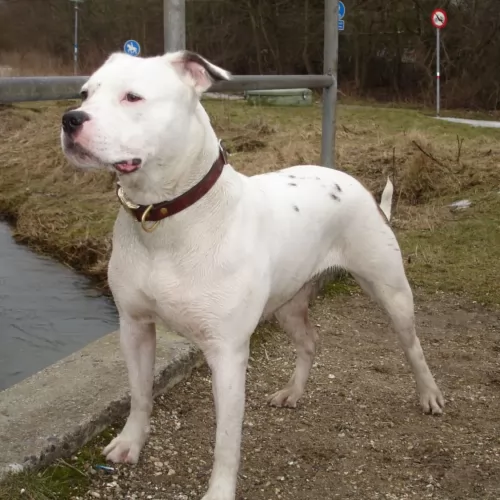 Although the Antebellum Bulldog is quite intimidating, this dog can make a great pet thanks to its loving, patient, and extremely tolerant characteristics. This dog enjoys playing with young children as well as other members of the family although proper care should be observed to avoid injuring young toddlers due to their muscular bodies.
Although the Antebellum Bulldog is quite intimidating, this dog can make a great pet thanks to its loving, patient, and extremely tolerant characteristics. This dog enjoys playing with young children as well as other members of the family although proper care should be observed to avoid injuring young toddlers due to their muscular bodies.
The Antebellum Bulldog is a protective dog breed with very strong guarding instincts. New visitors will have to be very careful as these dog breeds are quite wary of strangers and will not treat them politely. However, if you become familiar with them, they are likely to know you and later accept you as part of a large family.
Speaking of adaptability, the Antebellum Bulldog is more of a working dog than a household pet. Although some people will prefer to keep them indoors, always ensure that your homestead has a backyard where they can exercise. Otherwise, these dog breed will prefer to be kept in rural areas where there are vast tracks of land for them to play on.
Finally, the Antebellum Bulldog is an intelligent dog with a very sharp memory. However, due to their extremely playful nature, they can become very stubborn and messy. Therefore, owners are advised to train them early enough before they are fully grown.
 A love of children and devotion to his pack (family) is bred into the American Mastiff. He is non-aggressive unless you threaten his family or his children. Then he becomes courageous, protective and defensive. This is a gentle giant most of the time, however due to size and the need for strong leadership, the American Mastiff should be socialized and trained early. If they are socialized and trained they will be calm, gentle dogs. They will remain protective and alert, but they will be friendly with strangers. They love to please their people and being highly intelligent they learn fast.
A love of children and devotion to his pack (family) is bred into the American Mastiff. He is non-aggressive unless you threaten his family or his children. Then he becomes courageous, protective and defensive. This is a gentle giant most of the time, however due to size and the need for strong leadership, the American Mastiff should be socialized and trained early. If they are socialized and trained they will be calm, gentle dogs. They will remain protective and alert, but they will be friendly with strangers. They love to please their people and being highly intelligent they learn fast.
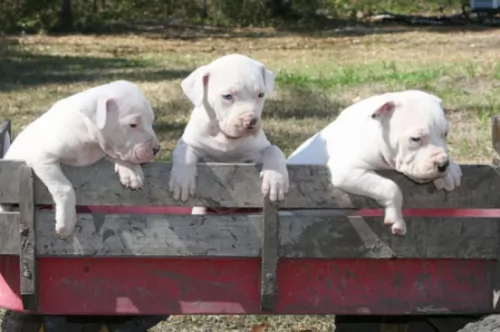 The Antebellum Bulldog has a life expectancy of 12—15 years. Recognized as an emerging breed, this dog doesn’t have many health problems as compared to most other dog breeds. Although these dogs are muscular and very athletic, these breeds suffer from various health conditions which are caused by the nature of their coat. Among the common health problems of the Antebellum Bulldog include
The Antebellum Bulldog has a life expectancy of 12—15 years. Recognized as an emerging breed, this dog doesn’t have many health problems as compared to most other dog breeds. Although these dogs are muscular and very athletic, these breeds suffer from various health conditions which are caused by the nature of their coat. Among the common health problems of the Antebellum Bulldog include
One major health problem that affects blue-eyed dog breeds (such as this one) is possible blindness. This condition is usually caused by diabetes, hypertension or Cushing’s syndrome. To treat this condition, you need to take your dog for regular veterinary checkups to know the root cause of the problem.
Another health problem that is very familiar with most Antebellum Bulldogs is hip dysplasia. Since these dog breeds are usually muscular and very huge, this condition is most likely to affect them, especially at an early stage. Dog owners should, therefore, be very familiar with this condition and should take their pets for regular veterinary tests to avoid it.
 American Mastiffs seem to have fewer health issues than other larger giant breed dogs. However, they can experience allergies as many large, wrinkled dogs do. They also might have a tendency toward eye issues, hip dysplasia, cancer and heart disease. Bloat might be the most life-threatening issue many American Mastiffs experience.
American Mastiffs seem to have fewer health issues than other larger giant breed dogs. However, they can experience allergies as many large, wrinkled dogs do. They also might have a tendency toward eye issues, hip dysplasia, cancer and heart disease. Bloat might be the most life-threatening issue many American Mastiffs experience.
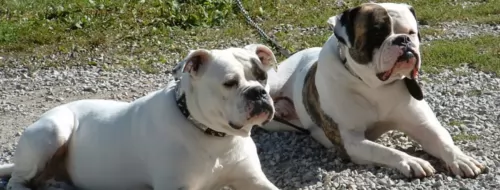 Feeding an Antebellum Bulldog is much similar to feeding other dogs. Owners are highly advised to stick to high-quality hypoallergenic diets that are rich in vitamins and nutrients. Now, since Antebellum Bulldog puppies are usually playful, feeding them with high nutrient food thrice a day will really help. Always avoid feeding your puppies with processed foods or foods with artificial sugars as they can expose the puppies to severe health problems.
Feeding an Antebellum Bulldog is much similar to feeding other dogs. Owners are highly advised to stick to high-quality hypoallergenic diets that are rich in vitamins and nutrients. Now, since Antebellum Bulldog puppies are usually playful, feeding them with high nutrient food thrice a day will really help. Always avoid feeding your puppies with processed foods or foods with artificial sugars as they can expose the puppies to severe health problems.
When feeding senior Antebellum Bulldog, there are some small changes you’ll need to make. First, these dogs will require high-quality foods that are easy to digest. Wet foods are perfect for Antebellum Bulldogs as they will help to keep them hydrated. Buy dog foods low in calories and rich in essential vitamins and nutrients to match your dog’s energy.
Antebellum Bulldog can add extra weight if proper care is not observed when feeding them. Due to this reason, these dogs should be fed depending on their level of activity to avoid cases of obesity.
Since their ancestors were used to guard rice plantations in Altamaha, Antebellum Bulldogs are very energetic and highly suited in rural settings over indoor lifestyle. However, if you decide to keep these dogs as pets in your households, it’s advisable that you provide them with some playing space in the backyard.
When it comes to training the Antebellum Bulldog, owners are advised to train them to be obedient at an early stage as they can get really stubborn in the future. These dogs are very intelligent and they never forget what they learn once they’ve mastered it.
 Giant breeds like the American Mastiff are known for growing rapidly as a puppy and therefore proper feeding and nutrition is essential. The slower your American Mastiff grows, the better. Make sure your puppies get enough phosphorous and calcium in their high calorie diet. Free feeding is not recommended. Feed puppies up to 4 small meals per day and feed adults twice a day.
Giant breeds like the American Mastiff are known for growing rapidly as a puppy and therefore proper feeding and nutrition is essential. The slower your American Mastiff grows, the better. Make sure your puppies get enough phosphorous and calcium in their high calorie diet. Free feeding is not recommended. Feed puppies up to 4 small meals per day and feed adults twice a day.
As previously mentioned this breed is a fairly healthy one, There, are however, certain evaluations you should do with your American Mastiff puppy to be sure she is in good health. These tests would include an elbow and hip evaluation to check for dysplasia. He should have an ophthalmologist and cardiologist examine him as well. Most American Mastiffs will not have any problems, but these evaluations will help to prepare you if they do. The wrinkles in your dogs; face, around the eyes and muzzle must be kept clean as they can become infected if you don’t.
Unlike the way he looks, the American Mastiff is not a couch potato, but neither are they a high energy, exercise machine. They do well living in apartments or homes, with or without a fenced in yard. They need a long walk every day. They need mental stimulation through exercise and games. Make sure they learn to love to play so that they don’t become lazy as they age.